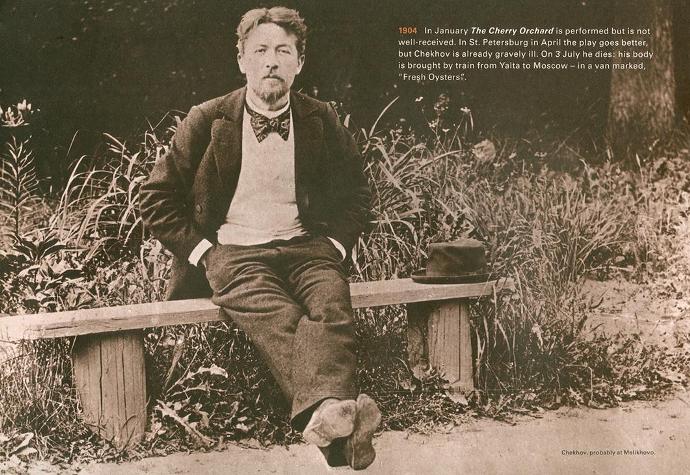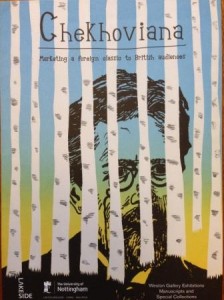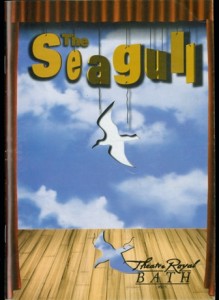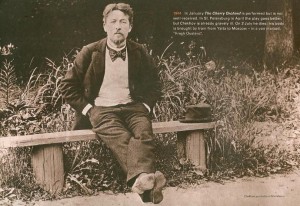
January 28, 2014, by Kathryn Steenson
Chekhoviana: Marketing a Foreign Classic to British Audiences
Our first exhibition of the year opened last week in the Weston Gallery, Lakeside Arts Centre. Visitors may notice a few changes, as the space has been decorated to reflect recurrent images of birch trees and seagulls found in the British marketing Chekhov; an appropriately visual setting reflecting the highly visual exhibition of Chekhovian theatrical ephemera on display. Anton Chekhov (1860-1904), Russian doctor, author, and playwright, is probably the most widely staged foreign dramatist in other cultures after Shakespeare. The British have a rich tradition of Chekhov performance from the beginning of the 20th century to the present day, although Chekhov himself was extremely sceptical, initially with good reason, about translations of his work. In 1900 in response to a query from a young translator about publication of his works in Britain, Chekhov wrote: ‘I am of so little interest to the British public that I don’t care in the least’.
‘Chekhoviana’, like ‘Victoriana’, implies not only the objects, but also the perceptions and characteristics typical of how Chekhov’s plays are staged in Britain. As Professor Cynthia Marsh, curator of the exhibition, explained “I have explored many Russian playwrights but always find myself returning to the genius of Chekhov. I hope I have caught some of his quizzical and quirky humour in the exhibition.” Chekhov wrote about people from the middle and professional classes: actors, doctors, rural teachers, and garrison soldiers and officers, rather than the wealthy landed gentry of writers such as Tolstoy. The marketing is often full of clichés, the kinds of stereotypes we associate with Russian life, both now and in Chekhov’s time, such as birch trees, vodka, samovars and onion-domed churches.
The majority of items in the exhibition are theatre programmes from 1912-2013, including several programmes for Nottingham productions. Part of the exhibition focuses on the ways in which Chekhov has been presented to British audiences: the kinds of visual material that have most frequently been used to sell tickets, and attract audiences to visit productions of his plays, as well as choices made by designers and directors to present Chekhov’s Russia whilst trying to make it seem familiar and accessible.
Exploring the theatre programmes, flyers and posters relating to Chekhov productions gives deep insight into British domestication and marketing for Chekhov plays. Theatre ephemera also shows how much the programme, in particular, has changed its function from being simple production information to providing cultural and historical contexts. It also shows how the marketing of Chekhov has responded to the changing perceptions of Russia in the theatre-going world and so, arguably, in society itself.
This exhibition has been jointly curated by Cynthia Marsh (Emeritus Professor of Russian Drama and Literature) and Manuscripts and Special Collections at The University of Nottingham, with support from The Shakespeare Centre, Stratford; Jesse Gardiner; Amanda Hodgson; and Michael Payne.
A series of talks and events will be held to accompany the exhibition. Admission is free but places are limited. To book in advance and to confirm the venue, please contact Lakeside Arts Centre Box Office on 0115 846 7777.
- Wednesday 29 January, 1pm – 2pm: Marketing Classic Plays
Stephanie Sirr, Chief Executive, Nottingham Playhouse, draws on her extensive experience of theatre management to illustrate the process of marketing famous plays, such as those by Chekhov.
- Tuesday 4 February, 1pm – 2pm: Modern British Theatre’s Response to Chekhov
Dan Rebellato, Professor of Drama at Royal Holloway University, is also a playwright. His Chekhov in Hell is about the Russian writer turning up in present-day Britain. He reflects on how modern playwrights react to Chekhov, the global writer.
- Thursday 20 March, 7.30pm: Chekhov without the Chekhoviana
A performance-lecture presented by Cynthia Marsh with Theatre Matters. Questions are posed about British perceptions of Chekhov and his Russia, and answers are sought by exploring the plays themselves in performance.
- Tuesday 8 April, 1pm – 2pm: From Bathos to Pathos: How the British fell in love with Chekhov and his plays
Rosamund Bartlett, is a biographer and translator of Chekhov, Visiting Professor, Rose Bruford College of Theatre and Performance, and Founding Director of The Anton Chekhov Foundation. On the basis of her research expertise and knowledge of the plays she illustrates British affinity to Chekhov.
Manuscripts and Special collections is actively collecting material relating to British stage and theatre, and more information about these collections can be found using the subject term ‘theater’ (note the spelling!) in our online catalogue. We have recently catalogued the collection Ref: CHEK Manuscript material in the Patrick Miles Chekhov Collection, 1880-1998, which contains 29 boxes of research papers relating to the literary work of Anton Chekhov compiled by the translator and scholar Patrick Miles. The papers include theatre programmes, newspaper cuttings, card indexes and bibliographies. It is particularly strong on Russian and British criticism of Chekhov’s early works, and the history of the British staging of his plays.
If you want to know more about the exhibition or the historic collections that are held by Manuscripts and Special Collections, please visit our website, contact us at mss-library@nottingham.ac.uk, or follow us on Twitter @mssLakeside.
No comments yet, fill out a comment to be the first





Leave a Reply